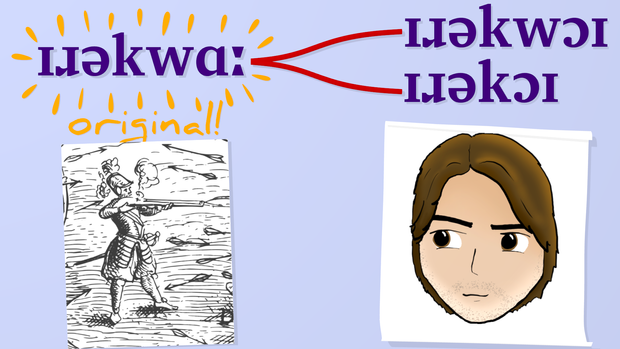
There was something about it though: engagement. Lots of thumbs and comments. I was curious to get a feel for any patterns in these comments, so I wrote a program to fetch them and figure out the most common interesting words.
At a glance, comments were very on topic and relevant. I appreciate that. Scrolling through myself, I noticed multiple instances of a complaint about the way I pronounced one particular word. "Iroquois" is not /'ɪɹəkɔɪ/, it's /'ɪɹəkwɑː/!
It struck me that I had never heard it pronounced that way in English. Why not? Were these comments all coming from the same people, or very different people? Where were these commenters from? Different places or all from the same place?
French Pastries, French Phonemes
In French I've heard and I think I've said /iʁɔkwa/. Why were people sort of imitating that pronunciation in English? And commenting as if they'd never heard anything else?
It reminded me of a pastry. A lot of pastries. Years ago I worked as a barista, which is just a spiffy way of saying I served coffee.
One day a customer comes in, dressed on the nicer side. He orders a small drip coffee, then hovers around the pastry case, mouth hanging just slightly open for a moment before adding more syllables: "...a-a-and one /kʰwɑ'sãːŋ/". I finish ringing him up with a thank you and a smile. Meanwhile I hear snickering coming from the apron-clad peers to my right, half-sheltered by the pastry case. "Kwa-SSANG!" Hehe... "Kwa-sssONNGG!" I half chuckle along, half shrug it off, but on that day I learn that my store has a pet peeve: "people who say kwa-ssang", outwardly cultured offenders who suddenly don a pseudo-accent when they pronounce borrowed words.
At first, these comments came across that way to me: be proper, say it the French way, even in English. But I'm not one to stop at first impressions. I had done a dictionary sanity check before I recorded Kinship. The pronunciations I found ended in /kɔɪ/ and /kwɔɪ/. After these comments, I went back and checked through dictionaries, IPA transcriptions and audio. Soon, I hit a couple of references to this other pronunciation. Ok. I jumped on Twitter and set up a poll.
In my own experience, this isn't an unfamiliar word. I heard it many times in school. Family and friends would all know it. My hunch is, if you were chatting with them and suddenly said "Iro/kwɑː/", they'd probably have the same kind of reaction as my fellow baristas. You're saying a word we all know but randomly using a funny foreign accent.
What about Twitter? The survey's not perfect, but the majority agreed ending it with a /kwɑː/ either sounds Frenchified or harder to understand. More of you than I expected did respond: no, Iro/kwɑː/ is just the way to say it. Even in the US. Still, who is saying it that way?
I waded through other videos with "Iroquois" in the title. I listened to the audio and waited for the pronunciation "Iro/kɔɪ/". Then, down to the comments. The same thing: a wave of objections. I was not alone.
Reading those comments, I finally got hints of a link between place and pronunciation. Canada. I jumped back to my Twitter poll, where results were still coming in. Helpful replies echoed, "Canada". Even more reading, and it seems like if you're Canadian, you can't fathom anything other than /kwɑː/. If you're from the US, it's about /kɔɪ/. Even if you consider yourself... Irokwaoi. According to my Twitter poll, it is messier. There's more to this than just a border.
How History Says "OI" (and "R")
Then why can't we accept that we use different pronunciations, that there are multiple ways to say it, and move on? The argument I'm seeing in multiple comments could be summed up like this: the word comes from French so the French way is the original way. These other pronunciations are deviant. This is a common sentiment, and I see the attraction. Surely the old way feels like the right way to go. It's the original. Everyone else is just using a new, changed pronunciation.
I'll create a simple underlying rule to explain the right way of doing things:
"Pronounce the word as you would in French"
So, I should be saying /iʁɔkwa/? No, probably not entirely the French way. I shouldn't imitate French phonology in English. I should just use a nativized pronunciation. You know, modify a Frenchified /wa/ while pronouncing the rest of the word following English phonology. Our rule's been compromised, but let me rewrite it a bit:
"Pronounce /ɑː/ not /ɔɪ/ because that part sounds closer to French"
This new rule lets me focus on that little diphthong "oi" and ask about origins. How was this word pronounced in French? Not is... was. Originally.
See, the term did come through French, but French in the early 1600s. French explorers tried to fit their already strained spelling system around new sounds. Starting with Samuel de Champlain, "Iroquois" is the term used for a large confederacy of people who spoke many related languages.
At this point it would really help to know which Iroquoian word or phrase stands behind this term. I could say, "Aha, see! If original is best, why don't you say it this way?" After centuries of debate, even including the idea that the name may come from Basque, the ultimate origin and meaning of the name aren't clear. (Open the "theories" section of the Wiktionary entry for a good summary.)
Even stopping at French, there's more story behind the comments. The French language has changed a lot in 400 years. The letters "oi" typically sound like /wa/ now. Huchon's history tells us on page 214 that [wa] became popular in the second half of the century leading up to the French Revolution. Before that, "oi" sounded like /wɛ/: iroqu[wɛ]. That pronunciation might still sound familiar to many living in Québec today.
The /r/ was still trilled [r] among everyday people and only became that trendy, throaty uvular [ʁ] among the popular crowd as the 1600s wore on. Galazzi and Boukia agree that the uvular pronunciation was late, prestigious and urban in their look at French "r" through time.
Maybe if we put the history together, we can Frenchify the word "Iroquois" properly. Should we actually be saying [irɔ'kwɛ]?
The Right Way
I know, I know, this one word turned into a whole adventure for me. But I do wonder, when commenters say a word sounds right or wrong, what do they mean? What do I mean when I claim somebody "said it wrong"?
If I grew up pronouncing a word one way, I naturally tend to do that in the videos unless I'm showcasing something about a particular language. But what if my normal pronunciation (and the pronunciation of my teachers, friends, family and colleagues) sounds strange to part of the audience, or even a lot of the audience?
I enjoyed learning more about a pronunciation I'd never heard before. I mean, never. In the end, it wasn't the English I was familiar with, and it wasn't really French either. I learned something, about language, about me and about you. At least the Canadians among you.
Thank you for subscribing on YouTube and for being my patron here. If you're an upper-tier (Grapheme+) patron, you can see the art I drew for this exploration. I'm working on the next tale you voted for, but this was something extra for you.
-----
Image credits
- Samuel de Champlain: https://commons.wikimedia.org/wiki/File:Samchamprifle.jpg
- Charis SIL font: https://www.fontsquirrel.com/fonts/charis-sil
- Daniel font: https://www.fontsquirrel.com/fonts/daniel

